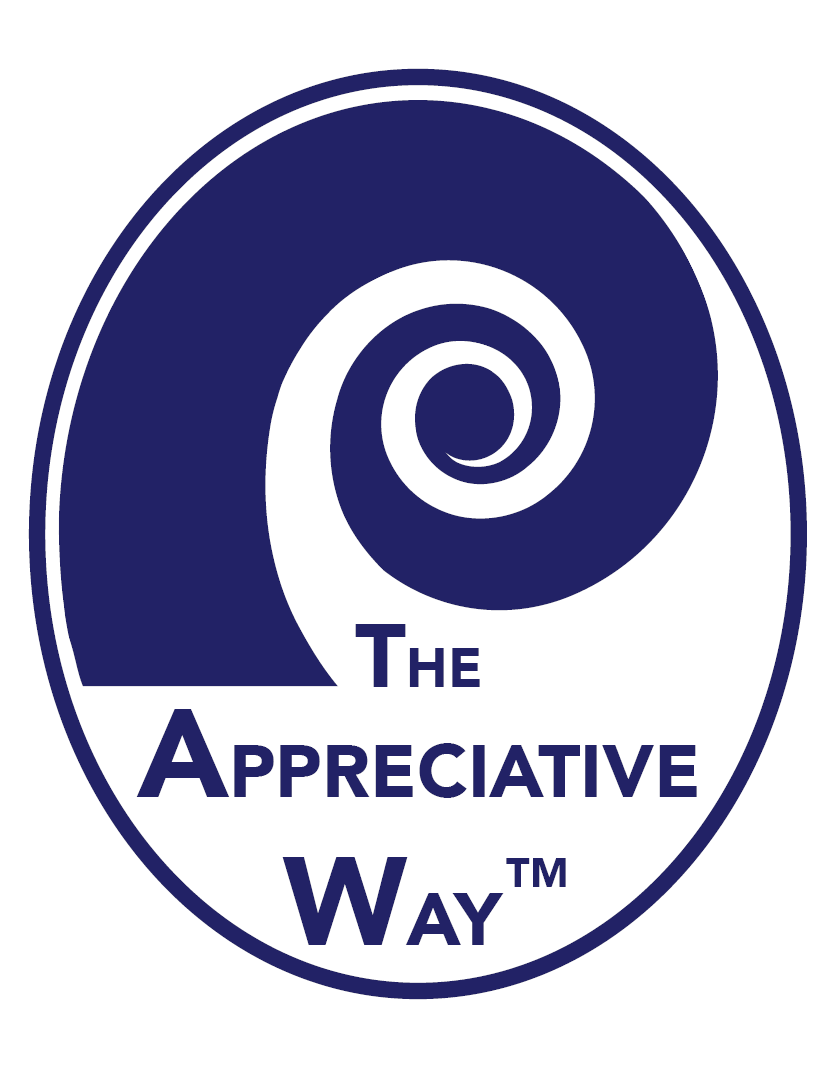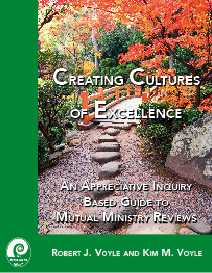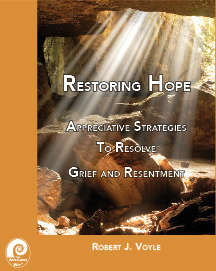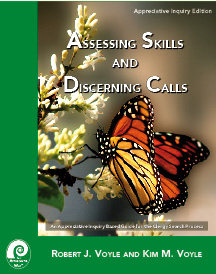

Rob Voyle's Appreciative Way Blog
Additional Articles By Year: 2016 | 2015 | 2014 | 2013 | 2012 | 2011 | 2010
Incarnational Leadership
Posted: December 12, 2013 by Rob Voyle
All sustainable change is an inside job
In general the church does a very good job of celebrating the incarnation. Sadly from my observation we don't do anywhere near as well in terms of practicing incarnational leadership. And in many conflicted situations I have been invited into, the failure to practice the incarnation has been at the heart of leadership failure.
Jesus didn't come and inflict salvation on us,
He came and lived as one of us.
At the heart of the incarnation is the process of entering into and joining with the system so that change processes are an inside job. People will naturally resist imposed change, regardless of the change's merits, because its imposition is a profound disrespect or denial of the essential dignity of the recipients of the change.
When joining with a system we need to join with its life-giving core.Then we can make changes that grow the life-giving core.
If we can't value what is life-giving to the people we probably should leave and shake the dust of our feet. If we stay and spend our time judging them for their attitudes and actions we will just end growing their and our ugliness.
People won't change because we judge or hate them,
at least in the direction we would want them to change.
The incarnation, God joining with humanity in Jesus, is a profound expression of God's valuing of humanity. And all those who joined with Jesus, "received him" in John's words, or mutual valuing in the language of the Appreciative Way, he gave power to become the children of God.
Appreciative Tip
In my coaching of clergy engaged in search process I encourage them to ask everyone they encounter in the search process "What do you value about your congregation" and then to prayerfully reflect on the question: "Can I value what they value?" Finding a place of shared value is the essential first step of incarnational leadership.
Exploring what we mutually value has many other benefits. It is likely to result in positive emotion which research shows will open people to greater degrees of creativity which will enable both parties to explore possibilities rather than be stuck in current realities. This will set the tone for a more rewarding conversation regardless of its outcome.
If you would like to learn more about the Appreciative Way of being an incarnational leader I invite you to participate in one of the Appreciative Leadership training programs. See http://www.appreciativeway.com/training/schedule.cfm for a complete schedule of training events.
In the meantime I wish you lots of love to lead the people entrusted to your care and encourage you to keep asking:
Rob
Check the Training Schedule for the latest listing of leadership training programs.
Changing the Paradigm of Blame
Posted: October 13, 2013 by Rob Voyle
I recently came across a relatively new approach, Trauma-Informed Care, as a foundation for providing mental health services to people, especially children in need of assistance. (See http://www.samhsa.gov/nctic/about.asp for more information.)
Trauma-Informed Care changes the basic paradigm from asking "What is wrong with you?" to "What happened to you?" Notice how changing the basic question radically changes the way we perceive of the person and what they are experiencing and doing.
Changing the basic questions is at the heart of the Appreciative Way. I would say that problems exist because we are asking the wrong questions. To often we ask; "What is wrong? or its more shaming version: "What is wrong with you?" and exacerbate the situation by evoking shame and blame rather than bringing creative solutions to the situation.
But changing the questions may not be enough. What we need to do is change the underlying paradigm that is prompting the question. Notice the problem that can arise in Trauma-Informed Care approach if the underlying paradigm of blame is still in place. "What happened to you?" now becomes the pursuit of external sources of blame for the person's problems rather than a foundation for pursuing solutions. Shifting blame is not the pathway to health and passionate living.
In many ways religion and psychology are very similar in that they share a foundation of seeking causality (blame) for humanity's problems. Religion gives us catalogs of sins (see Leviticus as an example). Psychiatry and Psychology give us catalogs of neurosis and more recently mental disorders as in the Diagnostic and Statistical Manual of Mental Disorders which is getting ever larger and more precise in describing the subtle difference in the varieties of human misery.
Diagnosis is just a sophisticated word for judgment and blame which in turn leads to alienation. Knowing what is to blame for what is wrong may make the expert feel intelligent but it doesn't help the sufferer. Too often eloquent descriptions of problems masquerade as solutions and do little to bring healing. All the experts feel good about their insights and still the sufferer suffers.
When the disciples asked Jesus: "Who sinned, this man or his parents, that he was born blind?' Jesus clearly rejected the pursuit of blame and judgment. The situation was an opportunity for the glory of God to be manifested rather than an opportunity for blame and judgment. (John 9:1-7)
St. Paul also challenges the idea that the law (catalogs of sins or mental disorders) can heal or bring life, in fact they just bring death. We need to change the basic paradigm of blame to one of grace. We need to move from helping people have less death (problems) to living abundantly.
To make the paradigm shift in the Trauma-Informed Care approach we need to add two additional questions after we ask "What happened to you?":
* How did you survive?
* For what life-giving purpose did you survive?
The first question moves the person from being a victim to being a survivor. Sadly many traumatized people never realize that they survived and they continue to live out a succession of victim experiences.
But simply surviving is not enough as it quickly becomes a journey of toil and endurance. The third question begins to move the person from a survivor to a thriver. To thrive we need to live from a place that is life-giving. From a place, that while it may be very different from before the trauma, is still a place of love and life. Christopher Reeve is one of my thriving heroes. Despite the profoundness of his injuries he went on to live an inspirational life.
The Appreciative Way offers a systematic approach to living beyond the paradigm of cause and blame and living in a life of grace. It is not simply a theory but a set of strategies that enables the core values of the Christian life such as love, grace, and abundance a reality.
If you would like to learn these strategies or apply them to the task of helping people through transitions then I invite you to participate in one of our upcoming training programs.
For a schedule of in-person programs please see:
http://www.clergyleadership.com/training/schedule.cfm
For a schedule of online programs please see:
http://www.clergyleadership.com/training/webSchedule.cfm
In the meantime I wish you lots of love to lead the people entrusted to your care and encourage you to keep asking:
Rob
Check the Training Schedule for the latest listing of coach training programs.
Core Leadership Competencies: Three Ways of Being a Leader.
Posted: August 6, 2013 by Rob Voyle
There are essentially Three Ways of Being in the World:
The first is to be here for ourselves. This is the narcissistic way, where everything revolves around the person and everything is here for the person. This is the way of King Nebuchadnezzar who boasts of his kingdom as he walks on the roof of his palace. He then has a psychotic break and ends up wandering in the fields eating grass with the ox. (Daniel 4:28-33)
The second way of being is to be here for others. This is the path of unenlightened social worker that results in codependency. (Sadly its a bit too late, but you can tell if you are codependent on your death bed when someone else's life flashes past your eyes ;-)
Being here for others is a big danger for many Christians who naively take to heart the biblical imperative to care for others. The outcome of being here for others is the older brother of the prodigal father story. He is always working hard waiting for his time of blessing to the point that he becomes embittered when others are blessed. This way is also found in those suffering compassion fatigue and burnout.
It is possible that you could compromise between being here for ourselves and being here for others. This is a really good way to be in a perpetual state of tension, always wondering if you have given yourself or others their rightful share. It is also a way of fear. Compromise is not a long term answer to anything as you will ultimately feel compromised which is a very miserable place to be.
Since being here for self, others, or a combination of the two, is not the path to well-being and effectiveness we need another way of being in the world.
The Third way of being in the world is to be here for God. This is the priestly way of being. Peter's "priesthood of all believers" is this way of being. Regardless of whether you are a leader in the church or a plumber or school teacher there is a priestly way of engaging in life and that activity.
This priestly way of being sets us free from the fear of failure and of letting people down and from the manipulations of others and our own desires. It saddens me that many leaders make the commitment to follow Jesus and proclaim him as Lord, only to let parishioners and Board members become the lord of their lives. Serving earthly masters is a great way to ensure a life of misery and ineffectiveness.
To be here for God requires that we know why we are here, why God created us. From my own work with appreciative inquiry I have discovered that each one of us has a unique individual purpose for being in the world. This purpose is often related to the simple things we love to do, cooking, walking, painting, reading, quilting, etc. all point to our eternal purpose.
When we are here for God, manifesting our core purpose we will simultaneously be saying Yes! to God, our neighbors, and ourselves. This is the place of love. This is where effective leadership begins, where we are doing and loving what we are called to do and calling others to do what they were called to do and love.
It is very important to distinguish between being here for God and being here for what we think is God or what others think is God. Too often I see tyrannical behavior done in the name of God that results in very ungodly suffering and misery.
It is not about calling people to do what we want, or us doing what they want, it is about being here for God and doing what God wants. Through the course of my ministry I consistently find that the one thing that God wants is: "God wants to be God," meaning God is not interested in Rob or others playing God.
If you have trouble discerning what God wants ask yourself or your leadership team these two questions:
What is God calling us to do? What is Love calling us to do?
Is the answer the same? If not which do you need to change, your understanding of God or your understanding of Love.
The priestly way of being in the world is to be here in the world for God, to be here for love. It is the place where we are not God and it is the place from which true joy can be found and from which you can freely lead the children of God to become the people of God.
In the next newsletter I will explore "Setting Priorities" as I continue this series on developing your leadership skills.
Leadership Training Programs. If you want to grow your core leadership skills then I invite you to participate in one of our Appreciative Leadership for Transformation programs.
For more information and registration please see:
http://www.clergyleadership.com/training/schedule.cfm
In the Leadership Training you will learn how you personally can manifest the core competencies of a leader as an agent of transformation in your community.
The leadership training is also a required course in the:
* Certificate of Appreciative Transitional Ministry
* Certificate in Appreciative Coaching
In the meantime I wish you lots of love to lead the people entrusted to your care and encourage you to keep asking:
Rob
Check the Training Schedule for the latest listing of leadership training programs.
Core Leadership Competencies: The Art of Wise Pruning.
Posted: June 20, 2013 by Rob Voyle
I grew up on a dairy farm in New Zealand, where we also had a large orchard. I love fresh fruit and one of my favorite pastimes as a child was to climb into whatever tree was bearing fruit and have more than my full of fresh fruit.
It was during those times that I learned the lesson of pruning. My father would often take to the trees in ways that would make me despair of every having another fresh peach or apple, yet come the next year I would once again have the joy of eating luscious juicy fruit.
While I have learned how to prune my fruit trees, I was hopeless at pruning ministries when I was in parish ministry. Too often I allowed tired, worn out ministries that bore little fruit to take life from the entire system. Three reasons predominated my failure to prune:
1. Stopping a ministry was seen as failure and therefore led to feelings of guilt. 2. I was afraid of the backlash from the stakeholders who were invested in the program. 3. I didn't know how to prune without eliciting guilt or fear.
Learning how to prune or stop a ministry is a core competency of leadership and is essential if we ask the great question: "Why are we doing this?" and we get no sensible answer that relates to the core purpose and values of the organization.
Here are some indications that you may need to prune a ministry:
1. The outcome is not worth the resources required to achieve it. When branches take more energy from a system than the fruit they provide it is time for them to go.
2. The ministry no longer supports the core values and purpose of the organization. Keeping a clear focus on the core values and purpose is at the heart of great leadership. When the fruit no longer relate to the core values and purpose they are a passing fancy. They may flourish like rank growth in a tree but they are an illusion as they don't contribute worthwhile fruit.
These two indicators are often at the heart of two more readily apparent indicators. 3. The ministry is a constant source of conflict and strife in the congregation. This conflict is a sure sign that at a deeper level there is no consensus on the core purpose of the organizations values and purpose.
4. No one is interested in being part of the ministry or doing the work. Peoples' tastes change. Sometimes a new generation isn't attracted to old varieties. Wise farmers grow fruit people want to eat and not persist in growing what they used to like and buy. Eventually entire orchards need to be replanted.
How to Prune a Ministry.
1. Get very clear about your core purpose and values and make sure the congregation knows them. When people know the core values and purpose they are more readily able to let go of those programs that no longer energize the purpose.
2. Gather all the stakeholders of the ministry and conduct an appreciative inquiry into their best experience of the ministry: "Tell me a story about your best experience of the ministry?" "What do you value about the ministry?"
3. Explore the timeless qualities of the ministry as expressed in their best experiences and what they value about the ministry. For example, people's best experience of an outreach ministry may actually have been fellowship and intimacy between the members as they engaged in the ministry.
4. Explore and creatively imagine new ways of engaging the timeless value of the ministry beyond the current way it is being manifested. Discern the movement of the Spirit as people imagine new possibilities.
For example, imagine a group of women who gathered over the years to do needlepoint as part of an annual church fair. They have aged, failing eyesight and arthritis have diminished their interest or ability to engage in needlepoint. The younger generation have neither the time or the interest to engage in the activity and so membership in the group is declining. The needlepoint members feel discouraged and frustrated that no one will engage in the work. In gathering with the women it is clear that what they really valued was not the needlepoint or the fair but the regular fellowship and being in relationship with others. Creating a regular coffee group or some other simple shared activity will enable the women to continue to access the value of fellowship when the needlepoint group, or the fair for that matter, is discontinued.
5. Ask the stakeholders what their objections to ending the ministry are and what would satisfy those objections. We don't want to overcome the objections we want to satisfy the objections. Overcoming someone's objection will be perceived as an act of violence and will invoke acts of violence from those who feel violated. Satisfying objections rather than overcoming objections is at the heart of the Quaker consensus model when they ask: "Are all hearts clear?" Creating the coffee group in the previous needlepoint example is a way of satisfying the objection of losing the timeless value of fellowship.
6. Publicly announce the plan by enfolding the plan in an awareness of the core values and purpose of the organization.
7. If resistance occurs return to steps 2-5 with the individuals who are resisting. If the resistance continues despite your best efforts to satisfy the objections be prepared to stay the course, by keeping your focus on the core values and purpose of the organization. This is not a time to be here for yourself, or for others but for God.
Leadership Training Programs. If you want to grow your core leadership skills then I invite you to participate in one of our Appreciative Leadership for Transformation programs.
For more information about our leadership training please see:
http://www.clergyleadership.com/training/schedule.cfm
Check the Training Schedule for the latest listing of leadership training programs.
Core Competencies for Being Your Congregation's Chief: Asking Powerful Questions.
Posted: May 30, 2013 by Rob Voyle
A secondary competency is:
Making it Safe to Answer Powerful Questions
This is the third in a series of newsletters focused on the core competencies of leaders. Previously I looked at Communicating a Shared Vision and Empowering Others. In this edition I will look at Asking Great Questions.
David Cooperrider, the founder of Appreciative Inquiry, has said that organizations grow in the direction of the questions they continually ask.
If you keep asking: "what is wrong?" you will grow in the direction of what is wrong. If you ask: "what is working well?" you will grow in the direction of what is working well. This is not to ignore what is not working well or to ignore problems in general, but the way we ask questions of the situation will determine our outcome. In my experience problems exist and are maintained because we are asking the wrong questions.
For example, in conflicted situations questions are typically framed around "why is the conflict occurring?" But the problem is never conflict, the problem is the lack of collaboration. In conflicted situations we need to be looking for seeds of collaboration, the solution, rather than origins of the conflict. Frame problems from the perspective of what you want more of, rather than what you want less of. Conflict management is nonsensical. What we need are reconcilers and collaboration builders. We have not been entrusted with a ministry of conflict management but a ministry of reconciliation.
The really important leadership question:
Why are we doing this?
This is an important question on both the macro level of the entire organization and on the micro level of a specific activity such as a committee meeting.
The "natural leader" in many situations is not the person who knows "how" to do a task but the person who knows "why" the task is being done.
Why does your church exist?
Is your answer the same as your parishioners?
Knowing and communicating the shared "why" of your church is the first task of leadership that I covered in the a previous newsletter: previous newsletter.
Competent leaders also ask the question: "Why are we doing this?" of every activity within the organization. Sometimes we need to ask the follow-up question: "And why would that outcome be valuable?" These questions may need to be asked iteratively to discover the deeper motivation behind an activity. Motivations that conflict with the core values of the organization will rarely inspire effective and sustainable outcomes.
For example, churches that create activities to help them grow because they need the money to survive will rarely be successful, because I do not know anyone who would gladly join your group so they could have a share in your debt. We need to create activities that enable us to manifest the core purpose of our organization in the world.
Form follows function is an old design rule. If we want to create or re-create or develop the form of a ministry we need to know the purpose of the ministry.
One of the most powerful questions to discover the core purpose of an activity is to ask: "Tell me the story of your best experience of this activity?" When getting the answer, seek the story of the experience and not simply the data. This is the classic appreciative inquiry question and the story will contain the life-giving quality and consequently the true purpose of the activity.
Last week I looked at the leadership task of empowering others. How we frame and ask questions can either empower of disempower people. For example, imagine you have given a person a task and a deadline and the task is not done on time. What question would you ask?
Most people will ask: "why haven't you done it?" This is a fundamentally useless question, as it will foster and create a culture of blame and excuse making which will disempower the person and the organization. At best the question and answer will make you feel a little better about why it wasn't done, but the critical issue of the task's incompletion remains.
The more important questions are: "what is the new deadline?" and "what do you need between now and the new deadline to get the task done?" Once a purpose has been established the questions need to focus on the resources required to manifest the purpose. Failure is simply an indication that there were insufficient resources to achieve success.
To creatively explore failure to discover the additional resources requires that we need to make it safe both to fail and safe to answer the questions. The underlying culture will determine whether asking the question will result in success or further exacerbate the failure. I have seen the same question work brilliantly in one organization and disastrously in another. In the first the answer led to additional resources, in the second the answer was used as an additional weapon to belittle and demean. Virtually no question, even the really appreciative inquiry based questions, are safe in an adversarial, punitive culture?
The "elephant in the room" phenomena simply means it is not safe to talk about something. Asking questions of the "elephant" will make the problem worse. The more important question is: "what do you and we need to make it safe to talk about the things that are currently not safe to talk about?"
Asking why we are doing this, and why would that be valuable, can often be done in a lighthearted teasing way, just as Jesus teased Nicodemus about being born again. This light hearted approach, based in an attitude of delight and acceptance will challenge the status quo and make it safe to explore the difficult issues of whether to create, change, or discontinue a particular ministry
One of the big challenges many churches face today is that they are engaged in ministries that are no longer life-giving, or that the life-giving outcome is costing too much in terms of time or energy or money to achieve. These are ministries that no longer have a sustainable life-giving outcome and need to be stopped, or at least pruned to use gardening metaphor.
In next week's newsletter I will explore "How to Prune a Ministry" something many in the church avoid or are not very good at but is an essential leadership competency if we are to have vibrant congregations.
If you want to learn more about leadership and grow your core leadership competencies consider participating in one of our Appreciative Inquiry based leadership training programs
For more information and registration please see:
http://www.clergyleadership.com/training/schedule.cfm
In the Leadership Training you will learn how you personally can manifest the core competencies of a leader as an agent of transformation in your community.
The leadership training is also a required course in the:
* Certificate of Appreciative Transitional Ministry
* Certificate in Appreciative Coaching
In the meantime I wish you lots of love to lead the people entrusted to your care and encourage you to keep asking:
Rob
Check the Training Schedule for the latest listing of leadership training programs.
Core Leadership Competencies: Empowering Others
Posted: May 23, 2013 by Rob Voyle
Who are you dependent on for your success? If you are not dependent on others you are not leading anyone. How you empower those you depend on will be crucial if you and your organization are to be successful.
Several years ago I consulted with a large corporate size church who wanted to redesign their model of governance. When given a goal one of the first things I ask is "why would achieving the goal be valuable to you?" The leadership team responded to that question by saying, "we need to know who is in power because we always have power conflicts here.
My response was: "I think you need to change the question, because as long as you keep asking 'who is in power?' you will have power conflicts." A much smarter question would be: "how do we share power to empower people for ministry?"
They came back with a non-linear model that was based on a nautalis spiral. While the model had lines of responsibility it also presented an organic process of empowerment rather than hierarchical lines of authority, which in my experience often dissempower people.
Who are your core team members? How do you exercise power among them? How do share power with them to empower them for ministry.
Leadership research indicates that being loving and caring toward your followers is essential to effective leadership, however it is not enough. To be perceived as a leader you must be seen manifesting power and having influence in the group. One of the best ways of manifesting power is by intentionally empowering others.
One of the last things Jesus did before the ascension was to give away his power and authority as he empowered the disciples.
Now empowering others is not about avoidantly abdicating from your own power. Too often clergy who don't feel comfortable being in power abdicate their responsibility by relying on a misuse of theological platitudes such as "servant leadership" or the "priesthood of all believer." Don't get me wrong these are very important leadership concepts within the church but they can be radically misused by leaders who don't feel comfortable being in power.
So, how do you share power?
Here are some ways to empower people:
1. Ensure that every people know the core purpose. People need to be empowered to do the mission of the congregation and not simply be empowered to do whatever they like.
2. Engage people at their point of passion to work on an aspect of the core purpose of the congregation. Setting people free to use their God-given passion for the sake of the Kingdom is a way to tap into their power. You don't empower people by lighting a fire under them, you empower them by fanning the fire that is already within them.
3. Engage all the stakeholders when making key decisions. People will work more passionately for things that they have chosen to do. Imposing decisions and plans on others will evoke resistance.
4. Stay love based rather than using fear based motivation. While fear may get people started it will never result in sustainable action, instead it will lead to burnout. Burnout is an indication of fear based motivation, especially the fear of saying "no." There are many things to say no to if you want to say YES to the truly important life-giving things in life.
5. Prioritize you time around equipping your core team. Don't simply delegate work without teaching and coaching people how to do the job you want them to do. Poor performance is often the result of poor teaching and coaching rather than lack of ability.
6. Make it safe for people to fail. It is impossible to be free to learn and succeed if we are not free to fail. Make failure a learning opportunity rather than a punishment opportunity. When people do fail ask: "What else do you need to be successful?" rather than: "Why did you fail?" or "What went wrong?"
7. Discover and recognize success. A little bit of acknowledgment and praise goes a long way in encouraging future action. Praise in public, correct in private. The task is to build up and empower not tear down and demean. Embed the praise in the core purpose and values of the congregation.
8. Get to know your core team well and individualize your empowerment strategy. One size does not fit all. Ask what they need to be successful. Some will need close supervision others will need a "hands off" approach.
Next week I will look at the core leadership competency of asking powerful questions and challenging the status quo.
If you want to learn more and grow your core leadership competencies consider participating in one of our Appreciative Inquiry based leadership training programs
For more information and registration please see:
http://www.clergyleadership.com/training/schedule.cfm
In the Leadership Training you will learn how you personally can manifest the core competencies of a leader as an agent of transformation in your community.
The leadership training is also a required course in the:
* Certificate of Appreciative Transitional Ministry
* Certificate in Appreciative Coaching
In the meantime I wish you lots of love to lead the people entrusted to your care.
Rob
Check the Training Schedule for the latest listing of leadership training programs.
Core Competencies for Being Your Congregation's Chief
Posted: May 17, 2013 by Rob Voyle
Chief's Primary Role: Communicating a Shared vision
One of the chief's primary tasks is to define the relationship of the tribe to the wider environment in which the tribe exists. In the leadership literature this is called creating a shared vision and purpose.
Can your average parishioner describe in 30 seconds or less what is the core purpose of your church? If they can't you are failing them as their leader. This is your first task as their leader to ensure that every one knows the congregation's purpose.
If you think your parishioners just "don't get it," start "giving it" or develop other ways to "give it."
Having a share vision and purpose provides several significant resources. It describes where we are going, and why someone should join us on that journey.
From an incarnational perspective the first thing to note is it is a "shared vision" not an "imposed vision." I do not consider myself a visionary. Through using Appreciative Inquiry, in which all the stake holders participate in creating the shared vision, I have learned how to help a congregation discover their shared vision and purpose. The
Once established it is now the leaders responsibility to hold the vision and continually remind the congregation of that vision.
Here are some core activities that can be used to grow that vision within consciousness so that every parishioner will know and be guided by the shared purpose:
Preach the purpose once a month. If you can't find your congregation's purpose in the Gospel appointed in the lectionary at least once a month you need to either change your purpose or change your lectionary.
Repetition and redundant communication is good When it comes to the congregation's purpose repetition and redundant forms of communication are essential to keep it in the forefront of consciousness. Think of how often Jesus keeps talking about the Kingdom of God.
Invite newcomers to join the purpose. Too often newcomers are invited to join the "club," a nice group of people who get together to engage in religious observations and rituals and have fellowship with one another. Your congregation is not a club it is community of God's people who are on a mission to transform the world. Invite newcomers to join in that mission.
Incorporate the vision into your liturgy. Some congregations recite the congregation's purpose as part of their dismissal, others incorporate it into the prayers of the people.
Tells stories of how the purpose is manifested. If you have a "personal sharing time" at council or vestry meetings focus the sharing on "how have you seen our purpose manifested in the past month?" This will bring the purpose into focus in very tangible ways at the beginning of the meeting and will build member relationships around the purpose.
Use the purpose to guide decision making. In board meetings ask the question: "How will this help us manifest our purpose?" If the activity in question is unrelated to the purpose then move on, let someone else do it.
Use the purpose to resolve conflict. When people have made a commitment to the shared purpose, the purpose can be used to arbitrate conflicts. Much of the conflict I see in congregations today is simply the result of having no clear unifying purpose. Without a shared purpose conflict will be a battle of personalities and personal preferences that violate the core values and purpose of Christianity. We have not been entrusted with a ministry of conflict management, nor are we called to teach people to fight fairly. We have been entrusted with a ministry of reconciliation and are called to teach people to love. We need to reconcile people to God and to God's purpose for the congregation before we try to reconcile them to one another.
In next week's newsletter I will explore "Empowering others to act" as the second core competency of leadership, for leadership is not in having power but empowering others to engage in helping the community to manifest its purpose.
Leadership Training Programs. If you want to grow your core leadership skills then I invite you to participate in one of our Appreciative Leadership for Transformation programs.
For more information and registration please see:
http://www.clergyleadership.com/training/schedule.cfm
In the Leadership Training you will learn how you personally can manifest the core competencies of a leader as an agent of transformation in your community.
The leadership training is also a required course in the:
* Certificate of Appreciative Transitional Ministry
* Certificate in Appreciative Coaching
In the meantime I wish you lots of love to lead the people entrusted to your care.
Rob
Check the Training Schedule for the latest listing of leadership training programs.
An Appreciative Lent
Posted: February 15, 2013 by Rob Voyle
What is appreciative inquiry's understanding of sin?
Because of the Appreciative Way's basic positive view of humanity the question of what we do about sin and problems is often raised at my training programs.
My basic answer is that I think sin is a bad thing. However focusing on stopping sin is usually ineffective, as St. Paul in his Epistle to the Romans graphically portrays. The harder he tries to stop sinning the worse it gets. Sins only power is to keep you sinning. it will also keep you miserable.
Notice how utterly useless guilt is to stop you sinning. We feel guilty after we do something not before we do something. Since it comes after the action it won't stop us from doing the thing we now feel guilty of. Making someone feel guilty won't change the past it will keep you trapped in doing what you feel guilty about. Alcoholics know this all too well. They feel guilty about drinking, and they know that for a brief moment they can assuage that guilt by drinking. This St. Paul's vicious conundrum.
The answer to sin is not less sin, it is to grow in grace and love. In the pure light of grace you are free to sin and free not to sin. And it is in that light that sin becomes uninteresting and loses its power. For those with a historical theological perspective there is nothing Pelagian about the Appreciative Way.
So what would an appreciative lent look like: Consider the goal, what is your desired outcome? Do you want people to have less sin or more grace? Do you want people to have less death or to have life? Do you want people to be less afraid or to grow in love?
Use your goal to shape the focus of your lent. Make sure anything negative is but a temporary waypoint in the pursuit of something profoundly life-giving.
There is absolutely no life in what we say no to. There is only life in what we say yes to. If lent is a time of denial it will be a time of death. On the other hand if the we deny or say no to some temporal distraction to grace and love, then the "little no" can be a window to a profound Yes!
So we could transform the typical lenten discipline of inviting people to focus on how they have failed to keep the commandments by asking:
"How has keeping the commandment been a blessing in my life?"
Think for a moment: How has only worshipping one God been a blessing to you? or How could worshipping only one God be a blessing in the future?
Here is a simple blessing that many church leaders could benefit from. Worshipping one God, means you have one Lord, and you don't need to acquiesce to the bullies and tyrants that inhabit your congregation, nor do you have to worship at the altar of personal approval, or the fear of losing a parishioner. Which God do you really serve and how is that a blessing?
So pay attention to your questions this lent. Take sin seriously, and take grace even more seriously.
With Lenten Blessings
Rob Voyle
See Restoring Hope for healing and change strategies based in the Appreciative Way.
Additional Articles By Year: 2016 | 2015 | 2014 | 2013 | 2012 | 2011 | 2010
Previous Posts By Category
Coaching
- I Saw Satan Fall From Heaven
- Church Growth Makes Absolutely no Sense
- Agents of Change or Agents of God, and What's Christmas Got to Do With It?
- Are You Using the Right Map?
- Coaching: Paul's Conundrum Explained
- Goals Must Be Imaginable
- Coaching Next Steps to Achieving Goals
- Shaman 101: Change the Question
- Changing the Paradigm of Blame
- The Sermon I Need to Hear this Christmas
- Blue Christmas Meditation
- What's the Purpose, What's My Purpose?
- Church Growth and Making Disciples
- Thinking about Language: Are People Assets or Treasures?
- Transfiguration and Agents of Transformation
- Managing Resistance to Change
- Ensuring Change is a Blessing
- Growing Leaders Through Intentional Coaching
- Forget Balance, Get Integrated!
- Get Feed-Forward not Feed-Back
- The Power of Great Questions
Forgiveness
- No Reconciliation Without Repentance
- Moving Mountains of Resentment and Uprooting Mulberry Trees of Misery
- Teach Your Congregation to Forgive: Five Week Lenten program
- Forgiveness and Standing Silent Before the Pilates of this World
- Transforming Anger Into Practical Compassion
- Teaching Forgiveness and Staying in Love
- Stick with Love if You Want Others to Change
- I Tried, But I Just Can't Forgive: Part II
- I Tried, But I Just Can't Forgive: Part I
- The Power to Resolve the Past Is Within You?
- Teach Them How to Forgive this Sunday
- Transforming Victim Narratives: Mark 7:24-30
- 9/11: Resentment, Forgiveness, and Reconciliation
Leadership
- Parishioners and Staff are Treasures not Assets
- Anglican Primates: My Appreciative Way Perspective on the Conflict
- Leadership is About Empowering not Controlling
- Who is the Greatest: Calling Forth the Best
- Discovering the Power of an Ennobling Dream
- Incarnational Leadership
- Core Leadership Competencies: Three Ways of Being a Leader.
- Core Leadership Competencies: The Art of Wise Pruning.
- Core Competencies for Being Your Congregation's Chief: Asking Powerful Questions.
- Core Leadership Competencies: Empowering Others
- Core Competencies for Being Your Congregation's Chief
- Creating Sustainable Change through Incarnational Leadership
- The Challenge of Growing the Church
- All Sustainable Change is an Inside Job
- The Importance of Understanding Your Purpose
- Thinking and Acting Like a Leader
Performance Review
Sermon
- Those Damn Foreigners!
- No, You Don't Want to Take Your Ministry to the Next Level
- Why Be Good
- Teach Us to Pray
- We Are God's Chosen People Not God's Protected People
- Easter and Three Stories When Bad Stuff Happens
- An Appreciative Lent
- Remembering Dr. King
- Find Resurrection this Easter not Reincarnation
- Lent, Coaching, Change and Transformation
- Doing the Unexpected this Christmas
- Appreciatively Thinking about Lent and the Ten commandments
- Thinking about Lent, Sin, and Grace
- Lent and an Appreciative Approach to Repentance
Teaching Love
Tigers
Previous Posts By Date
2016
- The Amur Tigers Need You!
- No Reconciliation Without Repentance
- Confessions and Repentance for Election Failure!
- Those Damn Foreigners!
- Moving Mountains of Resentment and Uprooting Mulberry Trees of Misery
- Teach Your Congregation to Forgive: Five Week Lenten program
- No, You Don't Want to Take Your Ministry to the Next Level
- Parishioners and Staff are Treasures not Assets
- Why Be Good
- Teach Us to Pray
- Good Samaritans and What Is Love Calling Us To Do
- I Saw Satan Fall From Heaven
- We Are God's Chosen People Not God's Protected People
- Forgiveness and Standing Silent Before the Pilates of this World
- Transforming Anger Into Practical Compassion
- Teaching Forgiveness and Staying in Love
- Church Growth Makes Absolutely no Sense
- Anglican Primates: My Appreciative Way Perspective on the Conflict
- Stick with Love if You Want Others to Change
2015
- Agents of Change or Agents of God, and What's Christmas Got to Do With It?
- Teaching People How to Say Yes to Sex
- Leadership is About Empowering not Controlling
- Who is the Greatest: Calling Forth the Best
- What in God's name is Going On Here?
- I Tried, But I Just Can't Forgive: Part II
- I Tried, But I Just Can't Forgive: Part I
- The Power to Resolve the Past Is Within You?
- Are You Using the Right Map?
2014
- Christmas: God the slow learner, but thank Jesus, God learns!
- People in the Church Love Change!
- Teach Them How to Forgive this Sunday
- Coaching: Paul's Conundrum Explained
- Goals Must Be Imaginable
- Coaching Next Steps to Achieving Goals
- Mutual Ministry Valuation
- I Hate Performance Reviews: Creating Cultures of Excellence
- Why did Christianity Flourish: The Power of Your Easter Story
- Easter and Three Stories When Bad Stuff Happens
- Shaman 101: Change the Question
- The Search Process: It is not Dating
- Discovering the Power of an Ennobling Dream
2013
- Incarnational Leadership
- Changing the Paradigm of Blame
- Core Leadership Competencies: Three Ways of Being a Leader.
- Core Leadership Competencies: The Art of Wise Pruning.
- Core Competencies for Being Your Congregation's Chief: Asking Powerful Questions.
- Core Leadership Competencies: Empowering Others
- Core Competencies for Being Your Congregation's Chief
- An Appreciative Lent
2012
- The Sermon I Need to Hear this Christmas
- Blue Christmas Meditation
- Remembering Dr. King
- What's the Purpose, What's My Purpose?
- The Language of Growing in Love
- Church Growth and Making Disciples
- Transforming Victim Narratives: Mark 7:24-30
- Creating Sustainable Change through Incarnational Leadership
- Find Resurrection this Easter not Reincarnation
- Lent, Coaching, Change and Transformation
- Thinking about Language: Are People Assets or Treasures?
- From Transfiguration to Tempting Job Offers
- Transfiguration and Agents of Transformation
- Managing Resistance to Change
2011
2010
- The Importance of Understanding Your Purpose
- Thinking about Lent, Sin, and Grace
- Ensuring Change is a Blessing
- Thinking and Acting Like a Leader
- Growing Leaders Through Intentional Coaching
- Forget Balance, Get Integrated!
- Get Feed-Forward not Feed-Back
- Lent and an Appreciative Approach to Repentance
- The Power of Great Questions
The Appreciative Way

Discover the essentials of the
Appreciative Way in this fast
read format book by
Rob and Kim Voyle.
About the Author
Rob Voyle
The Rev. Dr. Rob Voyle is a leader in the development and use of appreciative inquiry in church and coaching settings.
Rob's Approach to Training
- Helpful: Training must provide practical, sustainable solutions for today's challenges.
- Humorous: Creativity and humor go together as people enjoy new insights.
- Healing: I create opportunities for people to experience transformational insights that lead to new ways of living, working, and being in the world.
>>
See more on Rob's
Helpful, Humorous, Healing
approach to training.
Creating Cultures
of Excellence
Appreciative Inquiry Based Guide to Mutual Ministry Reviews
- Templates and Worksheets
- For Congregations
- Individual Performance
- Coaching Strategies
Restoring Hope
Practical Appreciative Inquiry based strategies to effectively resolve grief and resentment.
Teaching Congregations
How To Forgive
Teaching Forgiveness
- Practical Processes to Teach People How to Forgive
- Five Sermon Outlines
- Five Adult Forums with Exercise Protocols and Scripts
Liturgies for the
Way of Love
An online library of:
- Liturgies
- Blessings and Prayers
- Seasonal Resources
- Retreat Liturgies
Available in pdf and MS Word Docx.
Restoring Hope Video
Watch author Rob Voyle help a client resolve traumatic grief using the strategies outlined in his book: Restoring Hope.
Clergy Search Resource
Over 380 pages of detailed strategies to Assess clergy skills and Discern Calls.
Now available as an online library.






